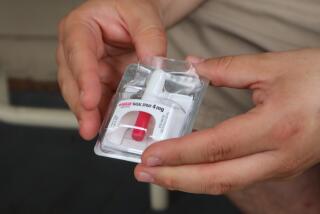California could be first state to bar drug makers from paying competitors to delay release

- Share via
Reporting from Sacramento — California would become the first state to block pharmaceutical companies from paying generic competitors to delay the release of lower-priced drugs under a bill announced Wednesday.
Legislation by Assemblyman Jim Wood (D-Healdsburg) attempts to end a practice known as “pay for delay,” in which a drug company stalls the release of a generic drug that would cut into its profits by paying the competitor to slow research, marketing or the sale of lower-priced prescriptions.
The bill, which is the first state legislation of its kind, would change the burden for proving whether there’s price manipulation by enshrining in the law that such secret settlements are presumed to be illegal unless a drug company can prove otherwise. By doing so, drug companies would be forced to disclose more information about settlements with rivals. California Atty. Gen. Xavier Becerra, who worked with Wood on the bill, said that would sharply increase transparency surrounding the confidential agreements that are otherwise masked as patent disputes.
At a news conference alongside Becerra on Wednesday, Wood said the pay-for-delay practice “really is a scheme.”
Coverage of California politics »
“We want to go after those who are trying to keep the prices of prescription drugs higher than they should be,” Becerra added. “I believe all Californians will appreciate that as well. No pharmaceutical company should be able to game the system at the expense of hardworking families.”
A bipartisan bill pending in Congress also would make illegal any deal that delays the release of generic drugs.
Priscilla VanderVeer, spokeswoman for the Pharmaceutical Research and Manufacturers of America, said the group is still reviewing the legislation but noted that the Federal Trade Commission already has the ability to evaluate the patent settlements and aggressively does so.
“Additionally, patent settlements generally permit generic drugs on the market earlier than patent expiration does, generating significant savings for consumers,” VanderVeer said in a statement.
The bill comes amid a national discussion over the high cost of prescription drugs. President Trump called attention to the issue in his State of the Union address this month, and Gov. Gavin Newsom has proposed that California create its own consolidated drug-purchasing system to increase the state’s purchasing power.
Addressing price manipulation would also go a long way toward putting affordable drugs in the hands of those who need it, supporters of the bill said.
The FTC has targeted pay-to-delay agreements in recent years, saying that drug companies are attempting to sidestep antitrust laws by claiming the payments are patent settlements. A study by the agency found the deals to delay generic drugs from being released cost consumers $3.5 billion in higher costs each year.
The FTC reached a settlement Tuesday with Teva Pharmaceuticals Industry Ltd. over allegations that the company partnered with competitors to slow down the release of generic drugs.
“It is outrageous when drug companies pay their competitors in order to keep prices inflated,” said Anthony Wright, executive director of Health Access California, a consumer advocacy group. “California is leading again on solutions to address problematic prescription drug pricing policies.”
Twitter: @MelodyGutierrez
More to Read
Get the L.A. Times Politics newsletter
Deeply reported insights into legislation, politics and policy from Sacramento, Washington and beyond. In your inbox twice per week.
You may occasionally receive promotional content from the Los Angeles Times.











